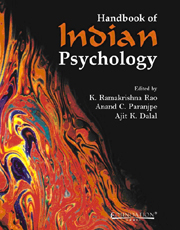Book contents
- Frontmatter
- Contents
- Contributing Authors
- Preface
- 01 Prologue: Introducing Indian Psychology
- 02 Indian Thought and Tradition: A Psychohistorical Perspective
- PART I SYSTEMS AND SCHOOLS
- PART II TOPICS AND THEMES
- 16 Indian Theories of Perception: An Inter-School Dialogue from Buddhist Perspective
- 17 Indian Psychology of Motivation
- 18 Personality in Indian Psychology
- 19 “Giving” as a Theme in the Indian Psychology of Values
- 20 The Making of a Creative Poet: Insights from Indian Aestheticians
- 21 Anchoring Cognition, Emotion and Behaviour in Desire: A Model from the Bhagavad-Gītā
- 22 Consciousness
- 23 J. Krishnamurti: Freedom from Knowledge
- PART III APPLICATIONS AND IMPLICATIONS
- Pronunciation and Transliteration of Sanskrit Alphabet
- Glossary
- Index
22 - Consciousness
from PART II - TOPICS AND THEMES
Published online by Cambridge University Press: 26 October 2011
- Frontmatter
- Contents
- Contributing Authors
- Preface
- 01 Prologue: Introducing Indian Psychology
- 02 Indian Thought and Tradition: A Psychohistorical Perspective
- PART I SYSTEMS AND SCHOOLS
- PART II TOPICS AND THEMES
- 16 Indian Theories of Perception: An Inter-School Dialogue from Buddhist Perspective
- 17 Indian Psychology of Motivation
- 18 Personality in Indian Psychology
- 19 “Giving” as a Theme in the Indian Psychology of Values
- 20 The Making of a Creative Poet: Insights from Indian Aestheticians
- 21 Anchoring Cognition, Emotion and Behaviour in Desire: A Model from the Bhagavad-Gītā
- 22 Consciousness
- 23 J. Krishnamurti: Freedom from Knowledge
- PART III APPLICATIONS AND IMPLICATIONS
- Pronunciation and Transliteration of Sanskrit Alphabet
- Glossary
- Index
Summary
Defining consciousness is notoriously difficult. Dictionaries tend to become self-referential when they try to define consciousness. The New Oxford Dictionary of English, for example, defines consciousness in terms of awareness, awareness in terms of perception and perception again in terms of consciousness. Professional dictionaries hardly fare better: the Penguin Dictionary of Philosophy escapes the problem by simply omitting the term. This ostrich like behaviour is, strangely enough, not an isolated phenomenon: to ignore consciousness has been the general policy of science for much of the twentieth century, and it is only during the last 25 years or so that consciousness has again become a legitimate subject of scientific and philosophical enquiry.
It is difficult to overstate the importance of consciousness. Though some hard-core physicalists have tried to trivialize consciousness as a more or less incidental side-effect of the complexity of our brains, it is good to realize that without consciousness we would simply not exist at all, or if we somehow still would manage to exist, there would be no way for anybody to know anything about it (or to know anything about anything else, for that matter). Without consciousness there would be no point to our individual life. In fact, there would be no point to anything. After all, even the most “objective” scientific explanations exist in the end only “in the eye of the beholder”. If consciousness would not be there to support them, not only beauty, love, experience, and truth would lose their meaning, but even scientific theories would dissolve into unobserved paper, ink, and fleeting plops of brain-chemistry.
- Type
- Chapter
- Information
- Handbook of Indian Psychology , pp. 414 - 428Publisher: Foundation BooksPrint publication year: 2008
- 1
- Cited by



